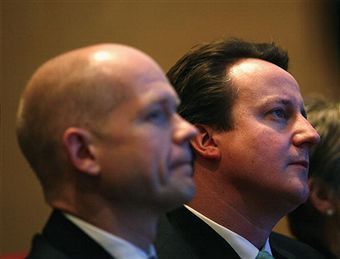 If you listen to the Tory front bench, you’d be excused for believing that Rue des Drapiers, 17-23, Ixelles in Belgium houses a place of unadulterated anti-British evil. What lies at this address? The European Defence Agency (EDA), which the Tory party has pledged to pull Britain out of should they win power.
If you listen to the Tory front bench, you’d be excused for believing that Rue des Drapiers, 17-23, Ixelles in Belgium houses a place of unadulterated anti-British evil. What lies at this address? The European Defence Agency (EDA), which the Tory party has pledged to pull Britain out of should they win power.
Does this institution really aim to curtail Britain’s procurement of its own military hardware, and suborn future purchases to a common European plan?
The truth is different and a lot more boring. The EDA does not procure anything for EU governments. It does not force the military to do anything. It exists to develop European defence capabilities in crisis management and to enhance European armaments cooperation. It also aims to strengthen the European industrial and technological bases in the field of defence. By trying to stop member-states buying material exclusively from national companies, a practice that produces neither quality nor the lowest price, it seeks to create a competitive European defence equipment market and to promote research.
The EDA most important aim is to boost military spending across the continent. Britain’s NATO allies spend too little and too poorly on defence. NATO has failed to integrate the defence industries of Europe and the United States. Nor has NATO succeeded in streamlining research and technology spending by becoming the hub of cooperative armaments projects. The EDA has had more success. It is creating greater transparency about European defence expenditure. From EDA we learn that Germany has 18126 MoD officials to its 97986 soldiers, but Britain has 85730 to its 194330 servicemen and women – that’s almost four times as many. It tells us that the average number of Italian troops deployed in 2008 was 5 percent; 6 percent in Spain and 3 percent in Poland (In Britain it’s 9.5%). Lest you think Britain always comes out on top, consider this: while the government spends €56,218 on average per soldier, Sweden uses €67,533.
Pulling Britain out of the EDA will not harm – or help – the British armed forces. But Britain does need capable allies. By participating in the EDA, the British government shows allies the way, ensures that defence projects are focused on the right things and can lead a coalition of operationally-minded states among the 27. The end result helps Britain on the battlefield – and cannot be replicated inside NATO if history is any guide to the future. So by all means leave the EDA. It is good politics. But it is worth thinking through how Britain intends to help allies spend more and better on defence.






Comments